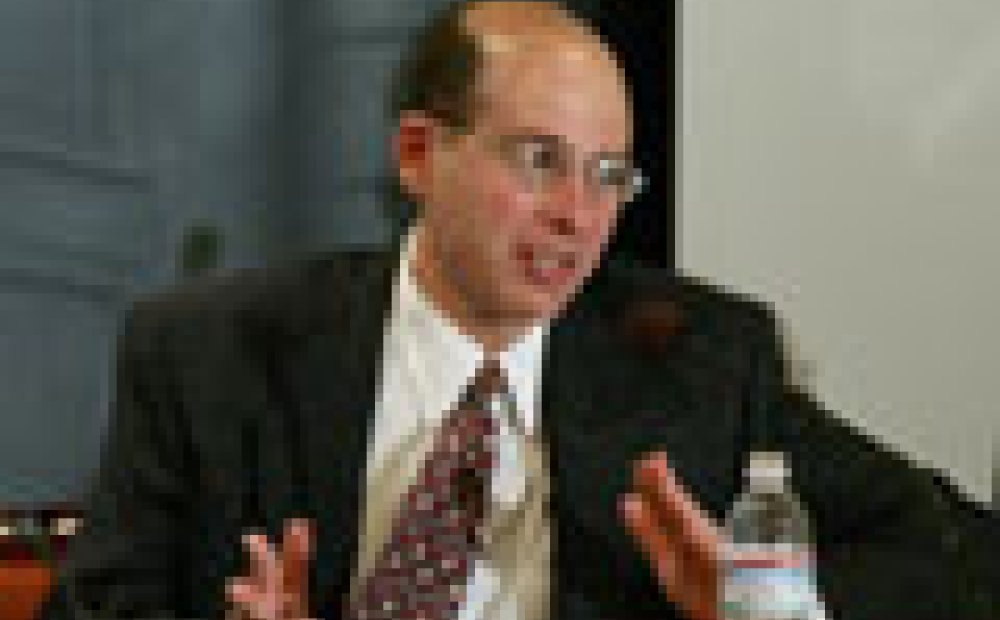Congress and Civil Liberties During War

What is the proper balance between liberty and security during war, and how much should the President, Congress and the courts determine the ultimate nature of that balance? This was the central question addressed by a Congress Project seminar on "Congress and Civil Liberties During War" at the Woodrow Wilson Center on November 15.
"The historical pattern during war," according to William and Mary Law Professor Neal Devins, "is for the President to have his way and for the Congress, the people, and even the Supreme Court, to back the President." Congress and the President have different goals, observed Devins, with the President intent on expanding his powers during wartime to protect the nation's defense and security interests, and Members of Congress more focused on getting re-elected and representing their constituents than on protecting their institutional prerogatives. "The cost of criticizing the President is too high," said Devins. Nevertheless, on the issue of civil liberties, the base line has changed over the last century. Since the "red scare" abuses following World War I, which gave birth to the modern civil liberties movement, and the internment of Japanese Americans in World War II, standards and vigilance have increased. While Congress may not be as sensitive or responsive as it should be to such threats, said Devins, the President does react to social and political forces outside Congress. This was the case with the military tribunal proposal that the President was forced to modify in the face of criticism from civil liberties lawyers and scholars, and editorialists and columnists.
Harvard Law Professor Philip Heymann gives the President and Congress a mixed report card on balancing security and civil liberties interests effectively since the September 11 terrorist attacks. Heymann credits Congress with trimming back on the investigative and surveillance powers the President requested in the USA PATRIOT Act and in successfully squelching the proposed TIPS program that would enlist citizen volunteers (including deliverymen and meter readers) to report on suspicious activities. He gives low marks for the detention of aliens and U.S. citizens and the treatment of aliens outside the U.S. Congress can be most effective in helping to balance interests when it asserts its oversight authorities over the Administration, when individual members speak out forcefully, and when riders are attached to appropriations bills limiting executive branch activities.USA Today reporter Joan Biskupic sees a slow shift in public opinion towards greater concern over threats to civil liberties the farther from the September 2001 attacks we get. Moreover, she sees the lower courts becoming more involved in challenging some of the Administration's investigative and detention tactics. She added, however, that she doesn't see the Supreme Court issuing any major, substantive reversals of the executive branch actions during the current crisis, though it may address some procedural concerns. Biskupic sees public pressure as the key to getting Congress or the courts involved in civil liberties issues raised by the new climate of fear over internal threats. She particularly credits some of the key players in Congress for exercising close scrutiny of the Justice Department's actions, including House and Senate Judiciary Committee Chairmen Patrick Leahy (D-Vt.) and Jim Sensenbrenner (R-Wisc.), Senators Carl Levin (D-Mich.) and Russ Feingold (D-Wisc.), and House Judiciary Committee Ranking Minority Member John Conyers (D-Mich.).
House Judiciary Committee Oversight Counsel Keith Ausbrook noted the high degree of bipartisan support for the USA Patriot Act which was reported from his committee by a vote of 33-0. While the Administration was not happy with the House version, many of its provisions survived negotiations between the two houses and the executive branch, including a four-year sunset requirement and a number of provisions requiring judicial review of wiretap orders and new surveillance authorities. The Committee has followed up on passage of the act by posing some 50 questions of the Justice Department on its implementation. While it took three-months to get the answers, says Ausbrook, the responses were for the most part satisfactory, though many portions were submitted as classified materials. This in turn has prompted a suit by the American Civil Liberties Union (ACLU) to determine whether all the classifications are justified.
Submitted by: Don Wolfensberger, Director, The Congress Project, Saturday, November 16, 2002.